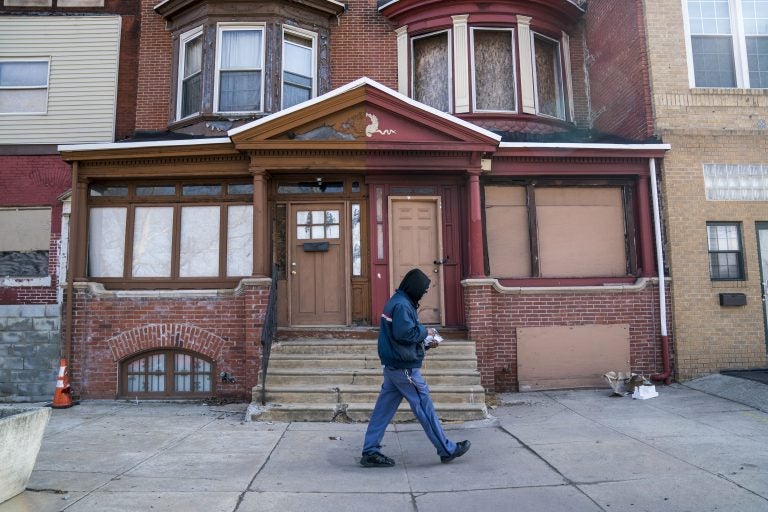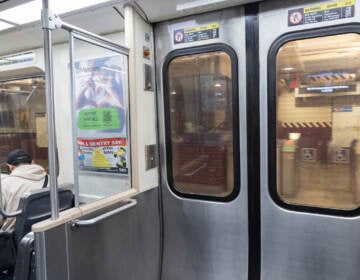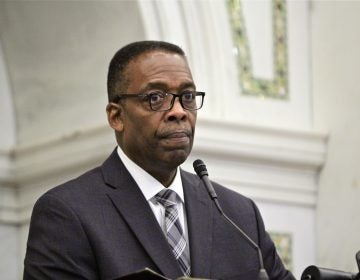Mayor expected to sign bill requiring developers give back to Philly communities
A bill mandating community benefits agreements for major development projects was passed by City Council on the last day of its four-year term.

A man walks down a residential street in Strawberry Mansion. (Jessica Kourkounis/WHYY)
A bill requiring developers to provide public services and amenities in neighborhoods where they build major projects was passed by City Council on the last day of its four-year term.
The Council vote moved the bill to the desk of Mayor Jim Kenney, who is now reviewing the legislation. He has never vetoed a bill.
The legislation, written by City Council President Darrell Clarke’s office, has won support from community groups who see it as a means to even the playing field with moneyed developers.
“It ensures the developers of these large projects will actively engage with the community and consider the impact on the area,” said Tonnetta Graham, president of the Strawberry Mansion Community Development Corporation, a group in Clarke’s district. “It will demystify the exchange process for developers by defining the coalition they will negotiate with and the time frame they will do it within.”
The bill has been totally re-written since its initial introduction, when many observers interviewed by WHYY felt that the bill was too vague to actually comment upon. But such a local government requirement is not unheard of: Detroit has a similar law on the books already.
The amended legislation still leaves much to be determined, and concludes with a clause asking the Department of Planning and Development to write the precise rules and procedures to ensure implementation of the bill.
Brett Theodos directs the Community Economic Development Hub at the Urban Institute, and knows the Detroit law. He says the bills differ in their levels of specificity. Philadelphia’s bill leaves far more to the city’s bureaucrats to figure out than is typical, according to his analysis.
“Every piece of legislation ever has an element of that, because you can’t put everything in the statute,” said Theodos. “But this gives almost no guidance in terms of what they want these people to actually do. I don’t see the action step. It just stops, it’s like it’s not done.”
But John Christmas, the Council President’s senior legislative counsel, says that the point of the bill is to create an open-ended framework for CBAs, or community benefits agreements, in areas where they aren’t being regularly won. That’s why the bill includes a list of potential benefits that could be asked for — things like affordable housing, employment opportunities, neighborhood improvements and youth development offerings.
“[The bill is meant] to give a framework, to add transparency, and regularity to the process, where community groups don’t have the development [experience of more sophisticated Registered Community Organizations, or RCOs],” said Christmas. “It wasn’t always clear what people should ask for, so this gives a framework for what a developer can reasonably be asked to do.”
Under the bill, CBAs would be required “wherever feasible” for “high impact development projects.” A project is considered “high-impact” if it covers at least 250,000 square feet of gross floor area or results in 100,000 square feet of “earth disturbance.”
There is nothing the city can do if a developer decides to flout the proposed law, unless the project needs public assistance. The bill defines “city support or financial assistance” as a transfer of public land, rezoning and tax increment financing, among other possible governmental supports. The penalties outlined in the bill only state that failure to comply with the law “may result” in denial of city assistance, a point of criticism for some.
“It would be better if the city listed itself as a party — or some agency as a monitor/enforcer — to actually give this bill some teeth,” said Akira Rodriguez, a lecturer at the University of Pennsylvania’s Weitzman School of Design and School of Social Policy & Practice. “For now, this is basically a resolution.”
Christmas says that the point of this bill isn’t to smack down developers, but to codify the kinds of agreements that can be made.
“There were community groups that just wanted the city to establish a fee, make them pay, and take that kind of an approach,” said Christmas. “But that’s not what the councilman wanted to do. We did not want to heavy-handedly start extracting like a tax or a fee. A lot of projects are by-right, so that would have been illegal.”
The legislation exempts projects that have public benefits, such as hospitals, parks, or projects where more than 50% of the housing units are designated as affordable. Projects developed by a governmental or quasi-governmental agency, or by a state-regulated utility, are also excluded.
The bill specifies that community benefits agreements will be negotiated by a “host community board,” a five-member body comprised of an appointee from the local RCOs, the Councilperson, the mayoral administration, and two others agreed on by those three.
There is no clear way to determine which RCO would be chosen in areas with numerous competing groups. A majority of neighborhoods in the city have more than one RCO. Christmas says that the groups will have to work that out between themselves.
But experts familiar with Philadelphia’s internecine patchwork of community groups say that won’t be as easy as it sounds.
“The most glaring gap I see in the Philadelphia law, as proposed, has to do with who would designate the coordinating RCO in a host community,” said Laura Wolf-Powers, who teaches urban planning at Hunter College. “This is totally unclear and would have big repercussions for what kind of climate of accountability was created.”
The legislation has encountered little opposition. No representatives of the Kenney administration testified about the legislation at the Rules Committee hearing. The Development Workshop, a small trade group, testified at the hearing. Their representative’s carefully-coached statement betrayed neither support nor opposition, though the group submitted a letter of support. Gary Jonas, treasurer of the Building Industry Association, told the Inquirer that the BIA supports the bill because it will “help everybody get a better feel about when it’s appropriate to have a community benefits agreement.” The Chamber of Commerce for Greater Philadelphia also submitted a letter in support of the bill, which received unanimous approval both at the Rules Committee and from the full Council.
On background, however, several developers have said they don’t oppose the bill because they don’t think it will do very much. After all, many neighborhood groups already force developers to the table to negotiate CBAs without government prompting. Given the holes in the legislative language and the lack of mandated penalties, the city’s development industry isn’t too worried.
The mayor has until the end of the year to sign the bill into law.
WHYY is your source for fact-based, in-depth journalism and information. As a nonprofit organization, we rely on financial support from readers like you. Please give today.







